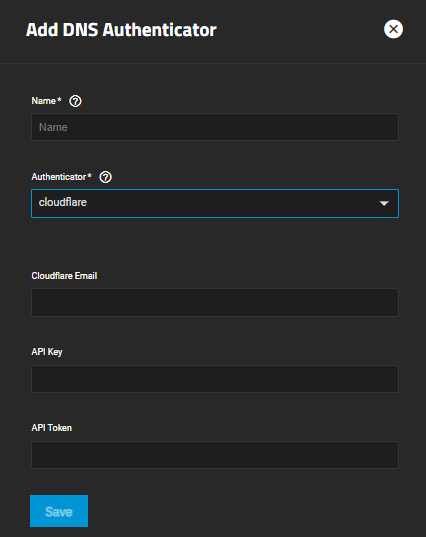Adding ACME DNS Authenticators
2 minute read.
Automatic Certificate Management Environment (ACME) DNS authenticators allow users to automate certificate issuing and renewal. The user must verify ownership of the domain before TrueNAS allows certificate automation.
ACME DNS is an advanced feature intended for network administrators or AWS professionals. Misconfiguring ACME DNS can prevent you from accessing TrueNAS.
The system requires an ACME DNS Authenticator and CSR to configure ACME certificate automation to proceed.
Before you begin this procedure, log in to your DNS authenticator provider service to obtain an API global key or an API token, whichever your service provider requires. When configuring an ACME DNS authenticator in TrueNAS using Cloudflare as the provider, you need the global API key but not the API token.
This procedure uses Cloudflare as the example. To add an authenticator:
Click Add on the ACME DNS-Authenticator widget to open the Add DNS Authenticator screen.
Enter a name.
Select the authenticator you want to configure. Cloudflare shows by default. Supported authenticator options are Cloudflare, DigitalOcean, Amazon Route 53, OVHcloud, and shell. Authenticator selection changes the configuration fields.
When selecting cloudflare as the authenticator, enter the Cloudflare account email address associated API key and the DNS domain. For Cloudflare, copy/paste the global API key from Cloudflare into the API Key field. If using an API token, do not enter the Cloudflare account email address.
When selecting digitalocean as the authenticator, enter your DigitalOcean Token.
When selecting route53 as the authenticator, enter your Route53 Access key ID and secret access key.
When selecting OVH as the authenticator, enter your OVH application key, application secret, consumer key, and endpoint.
Click Save to add the authenticator.
The DNS authenticator shows on the ACME DNS-Authenticator widget. To make changes, click on the for the authenticator, and then on Edit.
After adding the authenticator, you can configure a certificate signing request (CSR) for this authentictor and create an ACME certificate. For more information, see Managing Certificate Signing Requests.
The shell authenticator option is intended for advanced users. Improperly configured scripts can result in system instability or unexpected behavior.
If you select shell as the authenticator, you must enter the path to an authenticator script, the running user, a certificate timeout, and a domain propagation delay.
Advanced users can select this option to invoke an authenticator script and add an external DNS authenticator.
This requires an ACME authenticator script saved to the system. The script can invoke acme.sh or similar.




